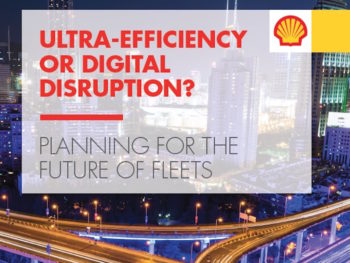Briefing: Shell’s Future of Fleet report
A new report from Shell finds that alternative fuel types, new technologies and changing vehicle types are presenting major challenges for fleets in Europe. Natalie Middleton looks at the findings.
The fleet industry is evolving at an unprecedented pace as the convergence of alternative fuels, new technology and services reshapes the sector but such challenges also present new opportunities for companies to enhance their operations, boost efficiency and keep competitive.
That’s the finding of Shell’s newly published Planning for the Future of Fleet report, which is based on a survey of 750 fleet professionals across four countries (UK, Germany, Poland and the Netherland), combined with Shell’s knowledge of driving trends and behaviour.
The report finds that almost four out of every 10 fleet managers in Europe expect just staying competitive to be a challenge soon. The three big changes respondents see coming are the adoption of new fuel types (53%), the introduction of new technologies (48%) and the advent of new vehicle types (47%), and the report sets out how fleets can take action in these areas.
Fuelling changes:
One of the most revealing findings is that 30% of fleet managers feel preparing their organisations for the broader use of alternative fuels will be one of the biggest struggles of the next five years.
Most fleet managers recognise the need to adapt to the energy challenge, reduce the environmental impact of their operations and adopt new, environmentally friendly fuels.
A total of 53% of fleet managers expect to adopt new fuel types within the next five years. Asked which fuel types they would choose for their fleet if they had an entirely free hand, 64% fleet managers chose either electric or hybrid not only over other types of alternative fuel, but also in preference to diesel and petrol.
Shell’s survey also finds that 28% of fleet managers would introduce electric vehicles to their fleets today if cost was no option. A further 26% would adopt vehicles powered by other alternative fuels.
Yet despite this relatively high level of consideration for alternative fuels, uptake remains slow. 35% of fleet managers say they anticipate challenges in integrating new fuel types into the fleet and 30% feel readiness for alternative fuels will be one of the biggest challenges of the next five years.
Their concerns are:
Expense, either upfront or running costs – 49%
A negative reaction from the company’s drivers – 30%
About compliance with relevant laws and regulations – 30%
In response, Shell says that for most fleets, a mosaic of different fuel types will be required to cater for different types of vehicle and usage scenarios and so comparing, benchmarking and partnering to provide the right infrastructure will be key for companies to deliver the best value and vehicle performance.
Transitioning to new technologies:
The Shell report also finds many fleet managers are positive about the prospects for new technologies but concerned about meeting resistance.
More than half (58%) say they are excited about the role new technologies will play in the evolution of the industry. Respondents singled out business technology — to streamline back-office operations (40%), to demonstrate business value and to enable wireless fleet monitoring – as having the greatest potential to transform operations.
However, a quarter (26%) of fleet managers don’t think senior management supports the introduction of new technologies. A further 25% say they will face resistance from drivers. And 40% admit keeping up with the latest technology is a challenge
The industry is also in two minds about autonomous vehicles with almost equal numbers viewing them as a threat (77%) and an opportunity (76%).
In response, Shell says that fleet managers must have the full support of the organisations they represent to drive evolution.
With the report claiming that almost two-thirds of fleets keeping their vehicles for less than three years, and only 7% keeping them for more than five years, it’s important that fleet managers understand new vehicle technologies and how to implement and manage them in their fleets if they are to remain competitive.
Shell adds that organisations urgently need to empower fleet managers to begin the process of evaluating and procuring tomorrow’s technologies. If necessary, fleet managers should consider bringing in outside expertise to achieve this goal.
Shell also outlines the importance of professional development for drivers on both fuel-efficient driving and virtual and augmented reality training, to ensure drivers are ready for the emergence of autonomous and semi-autonomous vehicles.
Further developments:
Shell’s Future of Fleet report also examines some of the most interesting new ideas in the industry, including how downloadable diagnostics and maintenance will change the way we look after vehicles and how the rise of the connected car will bring data that can greatly enhance fleet planning. It also outlines how a combination of wearables, telematics data and concierge tools will be able to provide drivers with valuable information about their health, stress and driving performance as well as automating basic tasks to free up time.
“The pace of change in commercial fleets is accelerating rapidly and the industry will look radically different within the next 20 years” said Katya Atanasova, Vice President of Shell fleet Solutions. “Alternative fuels, data analytics, automation and greater connectivity will require new business models, skills and partnerships between fleet operators, manufacturers, energy and technology providers and start-ups. For those responsible for managing fleets, there is also a need to engage drivers and the senior management in their organisations, to help test and capitalise on these new developments.”
To download Shell’s Planning for the Future of Fleet report, click here.


